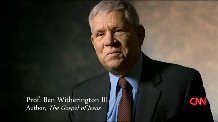It’s nice to be able to commend some of your contemporaries and their good serious scholarly work. One such contemporary is John M.G. Barclay, the current Lightfoot Professor of Divinity at Durham. John was at Glasgow before that and trained, if memory serves, at Cambridge. His first major book immediately got him all kinds of positive attention, and is entitled Obeying the Truth:Paul’s Ethics in Galatia (1991). This is an excellent close reading of Galatians and a helpful dealing with the old connundrum about the relationship between belief and behavior, and the need for obedience in the Christian life.
John is more than just an exegete or NT scholar, he also has expertise in early Judaism and his book Jews in the Mediterranean Diaspora from Alexander to Trajan (1999) is a standard work at this. There is also his Negotiating Diaspora: Jewish Strategies in the Roman Empire, (2004). In the same general area is his careful translation of Josephus’ Against Apion with annotation and commentary. One can commend his fine study guide on Colossians and Philemon (2004) as well.
There are several significant works John either wrote or collaborated on dealing with the issue of Paul’s relationship with Judaism, for instance Divine and Human Agency in Paul and his Cultural Environment done with Simon Gathercole in 2008, or his The Last Years of Paul some essays done with Orrey McFarland, due out this June. Another of his works on Paul, much anticipated is his study on Paul and the Collection, entitled Paul and the Gift due out this August.
There is furthermore his Early Christian Thought in its Jewish Context done with John Sweet in 1996. I could add to all this numerous seminal essays he has written, some of which he has kindly sent me copies of. One of the notable themes in some of John’s work goes against the popular trend of reading Paul as though he was critiquing Empire and Emperor, here there and yonder. John thinks that Paul is not engaging in anti-imperial rhetoric to the degree or in the way he is often portrayed as doing by scholars as diverse as Richard Horsley, Scot McKnight, and N.T. Wright. I tend to agree with John on this one. Indeed, the more I’ve read of John’s carefully reasoned remarks on this subject, the more convinced I have become. Paul is a Jew who despises any and all forms of idolatry, of which the Emperor cult is only one, and the only the latest kid on the block. Paul’s critique of idolatry includes that phenomenon, but rarely specifically targets it. Indeed, John is prepared to say that largely Paul saw the Emperor cult as an irrelevance, a flash in the pan that would be dealt with in due course when Jesus returned.













